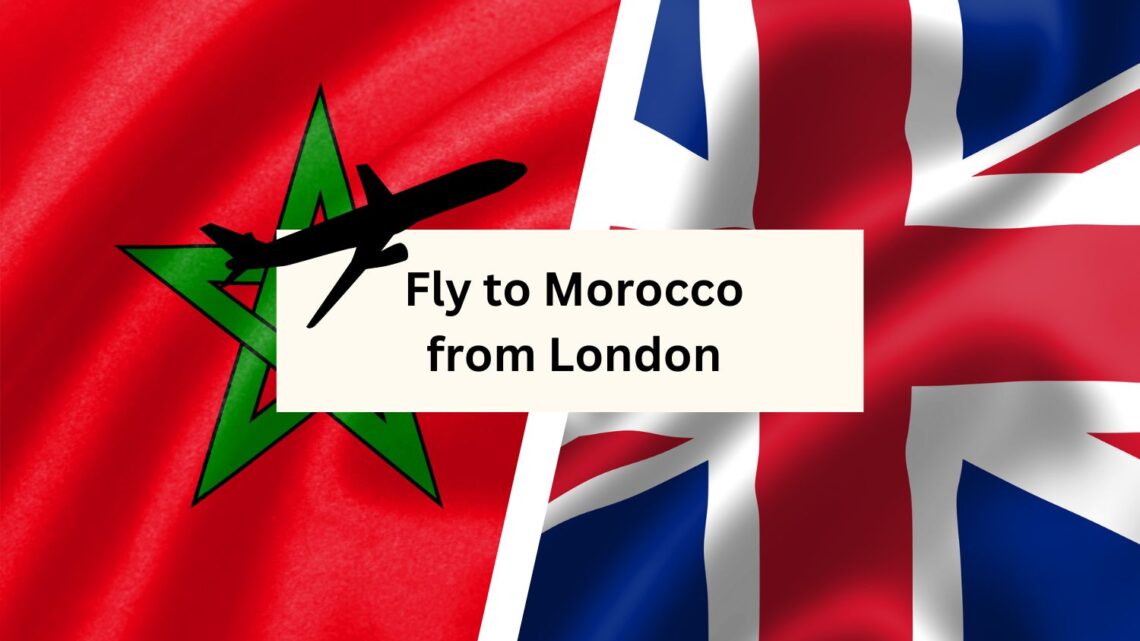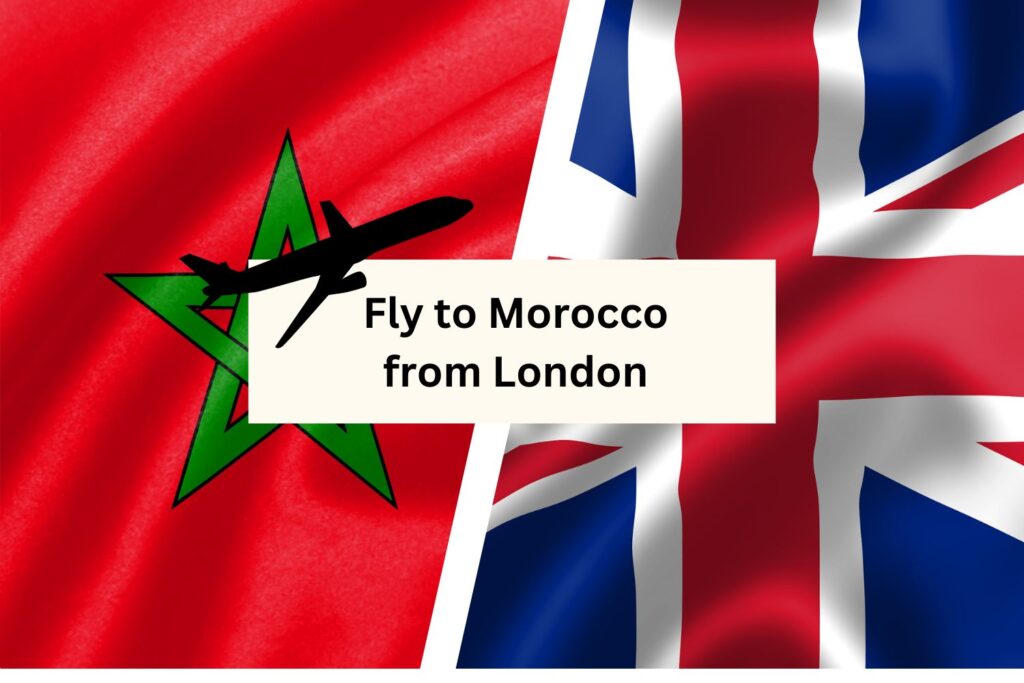

Fly to Morocco from London
Flying to Morocco from London is a great choice! There are several airports in London, so you’ll want to check which one you’ll be departing from. Heathrow, Gatwick, Stansted, and Luton are the main ones. Once you know your departure airport, you can look for flights to various cities in Morocco. Marrakech, Casablanca, and Tangier are popular destinations. Make sure to compare prices and flight times from different airlines to find the best option for your trip. Also, remember to check visa requirements and any travel restrictions that may be in place.
When planning your trip to Morocco from London , here are some additional details you might find helpful:
- Flight Options: When planning your trip to Morocco from London, consider both direct and connecting flights. Direct flights are typically more convenient but might be more expensive. Connecting flights might offer better deals but could involve longer travel times. It’s essential to weigh your priorities, such as budget and time constraints, to choose the option that best suits your needs.
- Airline Choices: Various airlines operate flights between London and Morocco, including British Airways, Royal Air Maroc, easyJet, Ryanair, and others. Compare their prices, services, and baggage policies to find the best fit for your preferences and budget.
- Travel Documents: When planning your trip to Morocco from London, consider both direct and connecting flights. Direct flights are typically more convenient but might be more expensive. Connecting flights might offer better deals but could involve longer travel times. It’s essential to weigh your options based on factors such as cost, travel time, and overall convenience to find the best flight for your journey.
- Airport Transfers: Upon arrival in Morocco after your flight from London, you’ll likely land at one of the major airports, such as Marrakech Menara Airport (RAK) or Casablanca Mohammed V International Airport (CMN). Arrange transportation from the airport to your accommodation in advance for a smoother arrival experience.
- Currency Exchange: The currency used in Morocco is the Moroccan Dirham (MAD). While you can exchange currency upon arrival, it’s a good idea to have some local currency on hand for immediate expenses like transportation or snacks.
- Local Customs: When planning your journey to fly to Morocco from London, it’s essential to familiarize yourself with Moroccan customs and etiquette to show respect for the local culture. For example, dressing modestly, especially in more conservative areas, is appreciated.
- Weather Considerations: Morocco has diverse climates depending on the region and time of year. Check the weather forecast for your destination to pack appropriate clothing and plan activities accordingly.
- Language: Arabic and French are the main languages spoken in Morocco, although English is widely understood, especially in tourist areas. Learning a few basic phrases in Arabic or French can enhance your experience and make communication easier.
- Accommodation: When planning your trip to Morocco from London, research and book your accommodation in advance to ensure availability, especially if you’re traveling during peak tourist seasons. Morocco offers a wide range of lodging options, including riads (traditional Moroccan guesthouses), hotels, hostels, and even luxury resorts.
- Transportation within Morocco: Depending on your itinerary, you might need to arrange transportation within Morocco. Options include trains, buses, taxis, and rental cars. Trains are a comfortable and convenient way to travel between major cities, while buses are more economical and serve a wider range of destinations. In cities like Marrakech and Casablanca, taxis and ride-sharing services like Uber are readily available.
- Health and Safety: When planning your trip to Morocco, it’s essential to check with your healthcare provider regarding any vaccinations or health precautions recommended for travel to Morocco. It’s also wise to have travel insurance to cover unexpected medical expenses or trip disruptions, especially if you’re flying to Morocco from London. While Morocco is generally safe for tourists, exercise caution in crowded areas and be aware of common scams.
- Cultural Attractions: Morocco boasts a rich cultural heritage and a wealth of attractions to explore, from historic medinas and ancient ruins to vibrant souks and stunning natural landscapes. Research the top sights and activities in your destination city to make the most of your time there.
- Local Cuisine: When planning your trip, don’t miss the opportunity to fly to Morocco from London and sample Moroccan cuisine, known for its flavorful tagines, couscous, pastries, and mint tea. Be adventurous and try local street food, but also dine at reputable restaurants to savor traditional dishes in a comfortable setting.
- Respect for Customs and Traditions: Respect local customs and traditions, such as asking for permission before taking photos of people, especially in rural areas. In mosques, non-Muslims are typically not allowed to enter prayer halls, so be mindful of cultural sensitivities.
- Souvenir Shopping: Morocco is famous for its handicrafts, including carpets, ceramics, leather goods, and textiles. Bargaining is common in souks and markets, so hone your negotiation skills for a more enjoyable shopping experience.
- Electrical Adapters: Morocco uses Type C and Type E electrical outlets, so if you’re bringing electronic devices from the UK, you may need adapters. It’s a good idea to pack these in advance to ensure you can charge your devices without any hassle.
- Internet Connectivity: While many hotels and cafes offer Wi-Fi, having access to the internet while traveling can be helpful for navigation, communication, and accessing essential information. Consider purchasing a local SIM card with data or activating an international roaming plan with your mobile provider.
- Sun Protection: Morocco can have intense sunlight, especially in the summer months. Pack sunscreen, sunglasses, and a hat to protect yourself from UV rays, particularly if you plan to spend time outdoors exploring cities or trekking in the desert.
- Language Apps: Download language apps or offline dictionaries to help you communicate in Arabic or French, especially if you’re venturing off the beaten path where English may not be as widely spoken.
- Emergency Contacts: Keep a list of emergency contacts handy, including local authorities, your country’s embassy or consulate in Morocco, and contact information for your accommodation. It’s better to be prepared for any unexpected situations.
- Tipping Etiquette: Tipping is customary in Morocco, especially in restaurants, cafes, and for services like guided tours or assistance with luggage. While it’s not obligatory, leaving a small tip as a token of appreciation is generally appreciated.
- Travel Apps: Consider downloading travel apps such as maps, translation tools, currency converters, and weather forecasts to make your journey more convenient and enjoyable.
- Photography Permissions: In some areas, particularly religious sites or markets, photography may be restricted or require permission. Respect any signage or guidelines regarding photography to avoid inadvertently causing offense.
- Travel Responsibly: Be mindful of your environmental impact and respect local wildlife and natural habitats. Dispose of waste responsibly and support sustainable tourism initiatives whenever possible.